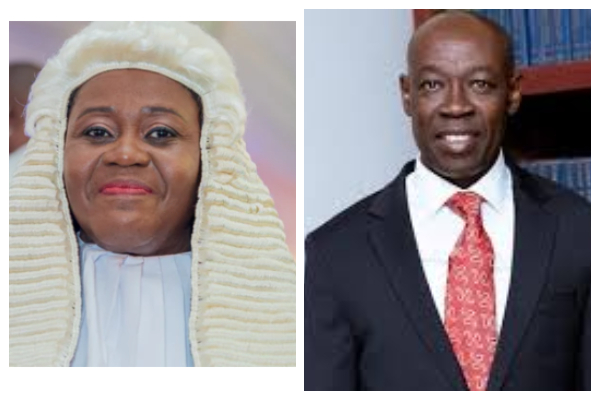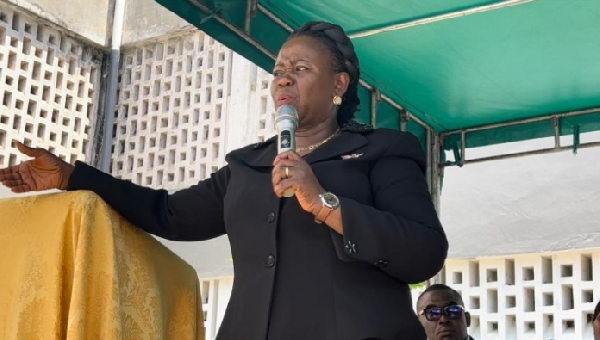Court jails 23 Chinese nationals for cyberterrorism, internet fraud in Lagos
The Federal High Court in Lagos has sentenced 23 Chinese nationals to one year in prison each for cyberterrorism and internet fraud linked to a massive cryptocurrency Ponzi scheme uncovered in December 2024.
The convicts were prosecuted separately before three judges – D.E. Osiagor, D.I. Dipeolu, and A.O. Faji.
In a statement on Monday, EFCC spokesperson Dele Oyewale said the convicted persons were part of a 792-member cyber-fraud syndicate arrested on 19 December 2024 in Lagos during an operation code-named Eagle Flush.
Mr Oyewale listed those sentenced to include Yu Hui (a.k.a. A. Bin), Huang Jin Hui, Fei Fan, Lu Qiang, Hu Xi Zheng, Sun Zhi Peng, Wu Hao, Cong Bing, and Li Qiang (a.k.a. Yang Huan Huan).
Others are Zheng Wei (a.k.a. A. Hong), Cheng Jian, Da Tou, A Wen, Zhang Lei, Huang Zhi, Pan Jiong, Chen Wen Yuan, Jia You (a.k.a. A. You), Wang Zheng Feng (a.k.a. Feng), Liu San Hua, Liu Beixing, and Wen Zong Xu (a.k.a. Li Long).
Each of the convicts was arraigned on one count of cyberterrorism and internet fraud.
The charge filed against Yu Hui (a.k.a. A. Bin) alleged that the defendant and others, sometime in December 2024, in Lagos, “accessed computer systems used for the purpose of destabilising and destroying the economy and social structure of Nigeria.” EFCC said the act constituted an offence contrary to and punishable under Section 18(1) of the Cybercrimes (Prohibition, Prevention, Etc) Act, 2015.”
Another charge accused Jia You (a.k.a. A. You) of accessing computer systems “for the purpose of destabilising and destroying the economy and social structure of Nigeria,” in violation of the Cybercrimes Act and the Terrorism (Prevention and Prohibition) Act, 2022.
Initially, all defendants pleaded not guilty.
However, during Monday’s sitting, they changed their pleas to guilty.
The EFCC prosecution team, led by Nneemeka Omewa, Babatunde Sonoiki, U.S. Kyari, and B.M. Isah informed the court that the defendants had entered plea bargain agreements.
The defence confirmed this and urged the court to adopt the agreements.
Accordingly, Messrs Osiagor, Faji and Dipeolu convicted each defendant and sentenced them to one year imprisonment, starting from their date of arrest — 10 December 2024.
The court also imposed a fine of N1 million on each convict.
The judges further ordered the Nigerian Immigration Service to repatriate the convicts within seven days of completing their sentences. All mobile phones, laptops, and routers recovered during the raid were forfeited to the Nigerian government.
Meanwhile, PREMIUM TIMES reported the hearing in the trial of Friday Audu and three others, accused of being the mastermind of the 792-member syndicate. The trial is ongoing before a judge, Daniel Osiagor of the Federal high Court in Lagos.
On Monday, a Union Bank compliance officer, Chidubem Ogbura, appeared as the first prosecution witness.
He told the court that Mr Audu is a signatory to a Union Bank account held by Genting International Company Ltd — a firm allegedly used to launder proceeds of the cyber-fraud scheme.
Led in evidence by EFCC counsel Bilkisu Buhari-Bala, Mr Ogbura presented account opening documents and transaction records, which were admitted as evidence.
Under cross-examination by defence lawyers, including Senior Advocates Clement Onwuenwunor and Emeka Ukpoko, the witness confirmed that Mr Audu and Bafale Yakubu were signatories to the account.
However, he noted that one of the other defendants was not a director or signatory to the account.
He also confirmed that the bank’s Know Your Customer (KYC) documentation did not indicate the account was opened to “gain business.”
The judge adjourned proceedings till 4 July for the continuation of trial and testimony by additional EFCC witnesses.
The EFCC had on 6 February arraigned Mr Audu, Huang Haoyu, An Hongxu, and Genting International Ltd on 12 counts of cybercrime, money laundering, and illegal foreign exchange transactions.
According to the EFCC, the defendants operated a cyber-fraud syndicate in collaboration with a Chinese national, Dualiang Pan, who remains at large.
The group allegedly recruited Nigerian youths to impersonate foreigners in romance and investment scams.
The EFCC said the syndicate retained $1.2 million and $1.3 million in cryptocurrency wallets controlled by Chukwuemeka Okeke, Alhassan Garba, and Ifesinachi Jacobs — believed to be proceeds of fraud.
The commission stated that about N3.4 billion was allegedly laundered through Genting Ltd’s Union Bank account, with additional sums traced to Pan’s UBA account.
They are also accused of conducting unauthorised foreign exchange transactions totalling over N2 billion, in violation of the Foreign Exchange (Monitoring and Miscellaneous Provisions) Act, Cybercrimes Act, and Money Laundering Act.
On Thursday and Friday last week, the Federal High Court in Lagos also sentenced seven Chinese nationals to one year imprisonment each after they pleaded guilty to similar charges.
The convicts — Peng Li Huan, Zhang Jin Rong, He Kun, Rachelle Cabalona, Caselyn Pionela, Guo Long Long, and Zhang Hua Zhai — were arrested in the same December 10 raid that netted 792 suspects, including 158 foreign nationals.

They were arraigned before Justices Ayokunle Faji, Chukwujekwu Aneke, and Yellim Bogoro. EFCC prosecutors Bilkisu Buhari-Bala, Chineye Okezie, and Banjo Temitope told the courts that each convict entered a plea bargain.
Each was sentenced to one year in prison with an option of N1 million fine. They were also ordered deported within seven days of completing their terms. All digital equipment recovered from them was forfeited to the federal government.
In another related case, a judge, Yellim Bogoro of the Federal High Court, Lagos, sentenced 12 Philippine nationals to one year in prison each after they pleaded guilty to similar cyberterrorism charges under plea bargain agreements.
The convicts — Anjeanette Topacio, Gladys Joy Mag-Iba, Jean Calago, Shairah Mae Reyes, Roseann Gonzales, Lari Jane Tayag, Mary Grace De La Cruz, Krystel Aquilesca, Jonilyn Agulto, Paizza Camara, Vivian Pionella, and Jonalyn Mendoza — were charged with unlawful access to computer systems and possession of fraudulent documents.

One charge accused Mr Topacio of “willfully accessing computer systems with the intent to destabilise Nigeria’s economy by recruiting Nigerian youths for identity fraud.”
Another count accused Mr Reyes of possessing a Telegram message containing fake identity claims.
Each convict received a one-year sentence with an option of N1 million fine.

The court also ordered their deportation to the Philippines within seven days after completing their sentence.
Four additional Filipino suspects, Marj Maranga, Zara Fabian, Dominique Medina, and Rachelle Cabalona (also listed among Chinese convicts), are still facing trial before Justice Musa Kakaki.













